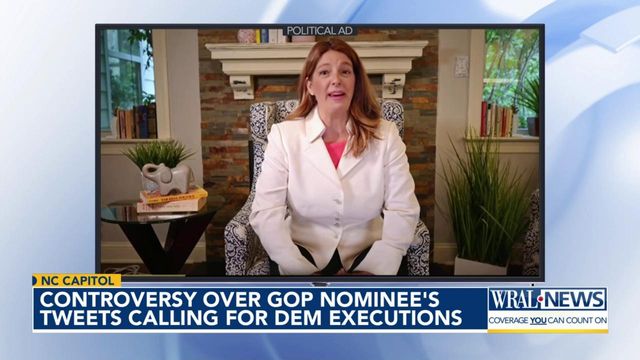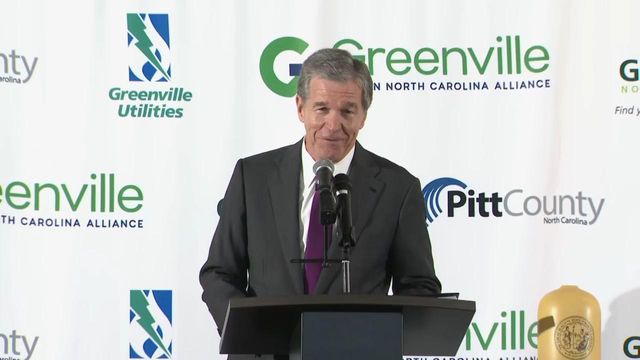NC Democrats try to use spotlight against GOP superintendent nominee
North Carolina Democrats are trying to capitalize on the national spotlight shining on the Republican nominee for state superintendent — giving unprecedented attention to a race that often flies under the radar.
State Democratic leaders highlighted past statements by Republican Michele Morrow during a news conference Thursday, saying that her advancement of conspiracy theories and repeated calls to execute prominent Democrats make her unfit to lead North Carolina’s public schools.
“We should not tolerate this,” Morrow’s Democratic opponent, Mo Green, said during the news conference at the North Carolina Democratic Party headquarters in Raleigh. He said posts show her much darker view of the world, “fueled by violence.”
Morrow called criticism of her social media posts a distraction from the issues. “Voters have chosen me to be the Republican Superintendent of Public Instruction nominee because of my plan to put scholastics and safety first in our schools,” she said in a statement to WRAL News after declining an interview request.
State parties tend to focus on top-of-the-ticket races in the walk-up to a general election. The Democrats’ news conference Thursday illustrated how the party is trying to remind voters that Green is running, too, as Morrow grabs a heaping helping of media attention.
Morrow mounted a surprise victory in the March 5 Republican primary, unseating incumbent Catherine Truitt. In the days and weeks following her win, national media outlets and political opponents have scrutinized her public comments and social media posts, which have called for a pay-per-view execution of former President Barack Obama, whom she considers a war criminal. She also called for the executions of other prominent Democratic politicians and Microsoft founder Bill Gates and his ex-wife, Melinda French Gates. Morrow accused Bill Gates of planning and funding a global pandemic.
Democrats have sought to highlight Green’s extensive education background, while Morrow’s supporters underscore her role as an outsider agitating for change. The North Carolina Republican Party, meanwhile, didn’t respond to a request for comment on Morrow’s social media posts. And others in her party have criticized her statements.
“Spewing terrorist propaganda and calling for public executions of elected officials you disagree with are things we usually hear from radical fundamentalists in places like Iran, Afghanistan, and Russia, not candidates running for office in North Carolina,” Daniel Keylin, a spokesman for Republican North Carolina U.S. Sen. Thom Tillis, said in a statement on Friday, adding that it’s “highly unlikely” that Tillis would support her. Morrow herself doesn’t support Tillis and criticized Truitt heavily for being endorsed by him during the primary.
Morrow Green are in a statistical dead heat in the race, according to a WRAL News Poll released last week. Morrow held 41% of the vote, while Green had 40% in the race to become the state’s superintendent of public instruction. Nineteen percent of respondents were undecided.
The poll, conducted in partnership with SurveyUSA between March 3 and March 9, had a credibility interval of 4.9 percentage points. A credibility interval is similar to margin of error but takes into account more factors and is considered by some pollsters to be a more accurate measurement of statistical certainty.
Meredith College political science professor David McLennan said Democrats are likely to continue using Morrow’s social media posts against her as the Nov. 5 election approaches. Her posts may not have deterred the more than 400,000 primary voters who supported her, he said, but they’ll catch the attention of independents and undecided voters. “They will matter,” he said.
While support for public schools has declined among some conservative voters, most North Carolinians still feel positively about public schools and believe in investing more in them, he said.
Educator vs. agitator
Green is a former lawyer who has spent the bulk of his career working in education, including several years as superintendent of Guilford County Schools.
“Mo has spent his entire career working hard to improve the lives of our students, our teachers, and he believes that public education dollars should be going to public schools,” Party Chairwoman Anderson Clayton said. “There cannot be a greater contrast between our nominees this year.”

Morrow is a homeschool mom and former nurse who hasn’t worked in public education. She campaigned relentlessly ahead of the primary. She has called schools “indoctrination centers,” saying public schools are too “woke,” and alleging that they’re pushing leftist agendas on LGBTQ issues and racial equality. She’s running for those parents who share her views but perhaps aren’t able to homeschool their own children.
“Political leaders have spent decades propping up a broken system, and people are tired of it. They want a leader who will work hard for the ones the system is supposed to serve: North Carolina children and their families,” Morrow said in a statement. “I have spent years outside the system advocating for education reform, and I will do the same inside the education system as Superintendent.”
Green on Thursday took issue with Morrow’s background and statements on public schools.
“If you want to run our public schools, you have to believe in our public schools,” he said, “You see public schools are the very engine of our economic success, bringing major corporations to our state, and sparking the creative energy behind so many of our homegrown [businesses].”
Green on Thursday cast himself as a long-time successful leader in education.
He took credit for increasing the four-year graduation rate while superintendent of Guilford County Schools, and for increasing the number of students taking college courses and for the increased number of students passing Advanced Placement or International Baccalaureate classes and exams in the county. The school system emphasized character education under his watch, something he said he’d do as superintendent. Green also wants to lobby lawmakers for more school funding and create a culture of celebrating schools and school employees.
Morrow doesn’t believe schools need more funding. She supports asking lawmakers for many changes, including smaller class sizes and a uniform student discipline policy that’s more specific than current state law.
The state superintendent oversees the administration of state and federal dollars, laws and policies through traditional public and public charter schools. Schools receive more than $11 billion state dollars and, typically, more than $1 billion federal dollars. The superintendent also oversees the state Department of Public Instruction, which assists schools with implementing laws and doing other tasks, sets course standards and awards grant funding, among other things.
The superintendent can’t raise employee pay or change policies. Only the General Assembly can do those things, although the superintendent can lobby them to do so. The State Board of Education adopts policies based on new state laws.
North Carolina’s schools are rising out of learning loss from pandemic remote learning, and in some cases and places have regained the learning lost. But schools are about to lose billions of dollars that have helped them make those recoveries temporarily and are partly leaning on DPI for guidance on how to move forward and maintain effective programming.
The state is also in the midst of a massive overhaul of reading instruction to be more focused on phonics and rigorous practice than on guessing words and independent reading.










